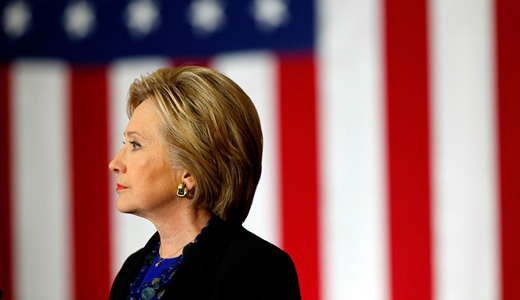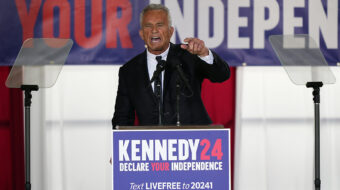
Last week in Madison, Wisconsin, Hillary Clinton gave a speech to a crowd of just 250 supporters. Many media reports covering the event made note of the fact that it was a fraction of the size of the arena-filling 8000-strong rally that the Bernie Sanders campaign pulled off in the same city just two days prior. Words like momentum filled many a newspaper column the next morning (much like today).
Given Sanders’ wide margin of victory in the Wisconsin primary last night – and the fact that it is his sixth win in a row against the former Secretary of State – perhaps the size comparison was one worth making.
But in the rush to compare Clinton and Sanders and sensationalize their tightening race, a lot of news outlets totally missed the boat. Clinton’s speech that afternoon was not just a departure from her usual campaign trail script – it was quite possibly the most important speech she has given so far in this election.
Taking a step back from the barbs she and Bernie have been throwing at each other, Clinton urged voters to take the long view when evaluating what Republicans are offering this election cycle. The product they’re selling isn’t new, she argued; it’s the same old bill of goods. The only difference is this time the party seems to be having trouble controlling who will be its frontman. Though some Republicans are reluctantly getting on board with Ted Cruz (or holding out hope for a contested convention), it’s looking increasingly difficult for the GOP establishment to stop Donald Trump.
Lest anyone start feeling sorry for hijacked Republicans, though, we’ve got to remember they got themselves into this mess. As Clinton pointed out in Madison, Republicans might be worried that “a Trump nomination will set their party back decades,” but they can’t pretend that he came out of nowhere. From indulging Trump’s Obama birth certificate nonsense a few years ago, straight up to Mitch McConnell’s refusal to vote on the President’s Supreme Court nominee today, all the pieces fit together in a clear pattern of obstructionism and recklessness. “When you have a party dead set on demonizing the president,” the Secretary reasoned, “you may just end up with a candidate who says the president never legally was the president at all.”
Truth be told, it goes much further back than just the non-issue of birth certificates. For decades now, the Republican Party has embraced a consistently escalating program of extremist positions on everything from the economy to criminal justice, from labor rights to social welfare, and everything in between. And, to be fair, it is also true that certain elements in the Democratic Party have been all too eager to trail not far behind the GOP, including a number of those traditionally associated with the Bill and Hillary Clinton political machine.
If the former Secretary had done nothing more that day in Madison than call attention to the continuity between the long reactionary Republican record and today’s ‘party of no’, she would have performed an important service for the cause of unity against the right.
But she went beyond that. Clinton doesn’t want voters just to keep in mind the GOP’s past; she also insisted that we give some serious thought to the future – especially the future of our nation’s highest court.
Bringing the issue of Supreme Court nominations down to the level of everyday life, Clinton reminded her student audience that “the Court shapes virtually every aspect of life in the United States – from whether you can marry the person you love, to whether you can get healthcare, to whether your classmates can carry guns around this campus.”
As she explained, “If we’re serious about fighting for progressive causes, we need to focus on the Court: who sits on it, how we choose them, and how much we let politics – partisan politics – dominate that process.”
But still, Clinton was making an even bigger point. In summarizing (and subsequently demolishing) every one of the GOP’s stated reasons for refusing to consider President Obama’s SCOTUS nominee, what Clinton really did was make a powerful argument that democracy itself is threatened by the modern Republican Party and corporate-dominated politics.
“The Court,” she said, has taken a “dangerous turn in recent years toward protecting the rights of corporations over those of people.” Clinton argued that Citizens United, which she pledged to overturn by means of constitutional amendment if necessary, is just the worst example of a legal system that has privileged “corporations against the interests of workers, unions, consumers, and the general public” in case after case.
On a tear, Clinton charged ahead:
“If I’m fortunate enough to be president, I will appoint justices who will make sure the scales of justice are not tipped away from individuals toward corporations and special interests; who will protect the constitutional principles of liberty and equality for all, regardless of race, gender, sexual orientation, or political viewpoint; who will protect a woman’s right to choose, rather than billionaires’ right to buy elections; and who will see the Constitution as a blueprint for progress, not a barrier to it.”
Powerful stuff.
If Sanders said it, no one would be surprised. But if you think it seems out of character for Clinton, then you haven’t been watching the dynamics of this fast-developing race closely enough. Though Hillary and Bernie have certainly been trading jabs a lot more in recent days, overall, these two candidates have strengthened each other in ways that are beneficial not just for them as individual leaders, but for the broad democratic center-left movement.
On almost every issue – from gender to race to economic inequality to campaign finance – Clinton and Sanders have pushed each other to take more advanced positions. That means whichever ends up with the nomination will be an even stronger leader against the Republicans.
And that is precisely whom Clinton returned to as she closed out her speech in Madison. The Republicans – those who, despite their promises to make the country great again, actually think so little of most Americans.
She quoted Iowa GOP Senator Chuck Grassley, who has refused to consider Merrick Garland for the Supreme Court on the grounds that, “The American people shouldn’t be denied a voice.” In a forceful defense of democracy and the Constitution, Clinton replied, “As one of the more than 65 million Americans who voted to re-elect President Obama, I’d say my voice is being ignored right now.”
She’s right. They are ignoring us. It’s time for the 65 million – and more – to make sure the GOP will have no choice but to pay attention come November.
Photo: Patrick Semansky/AP

MOST POPULAR TODAY

High Court essentially bans demonstrations, freedom of assembly in Deep South

Zionist organizations leading campaign to stop ceasefire resolutions in D.C. area

UN warns that Israel is still blocking humanitarian aid to Gaza

U.S. imperialism’s ‘ironclad’ support for Israel increases fascist danger at home







Comments